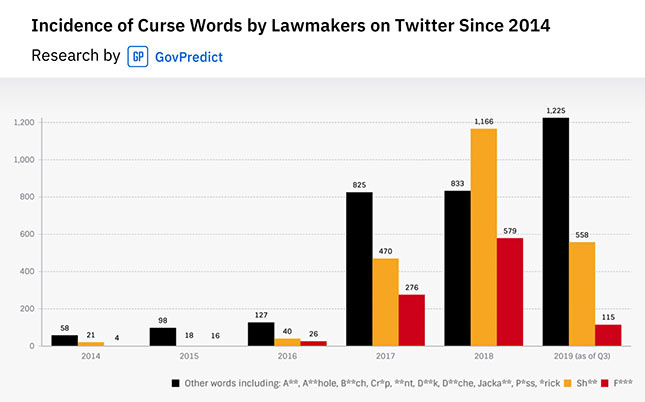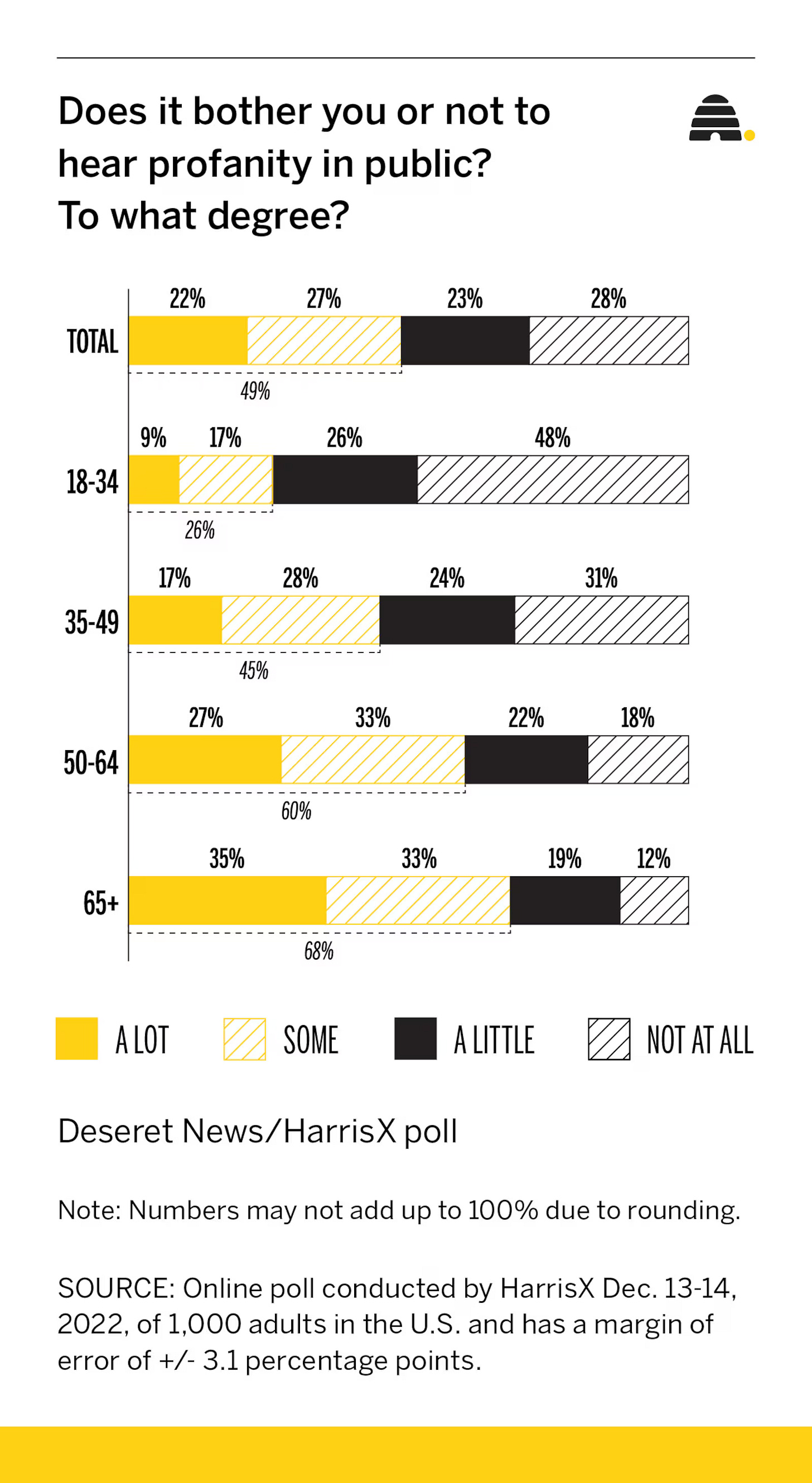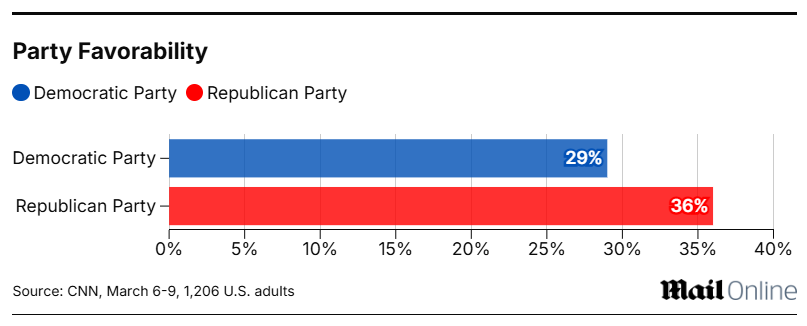Is Profanity Politically Appealing?
Potty mouths in politics are legendary, but has it been mainstreamed? Is it getting out of hand, and does it help or hurt the Democrats who increasingly use it?
It’s become so pervasive since President Donald Trump was sworn in nearly two months ago, it makes you wonder: Do Democrats have new polling research that shows Americans love profanity? I’ve yet to see it, but someone is telling them so.
Even the Democrats’ friendliest and most sympathetic media outlets are taking notice and writing about it. “‘Potty mouth’ Democrats have some new fighting words we can’t put in this headline,” the headline from Politico read on March 9th. “Profanity isn’t new in politics. But it’s reaching new heights on the left.”
The most recent example includes a viral set of identical videos produced for dozens of Democratic House and Senate politicians attacking Trump for failing to reduce inflationary prices he inherited from Joe Biden and big-spending Democrats. “Sh*t aint’ true,” are the first words from the partisan if wildly hypocritical attack on Trump.
Even my friend, the usually mild-mannered US Rep. Don Norcross (D-NJ), got into the act at a rally outside the White House. “F**k Trump,” he proclaimed. And he’s hardly alone, nor limited to legendarily potty-mouthed politicians from New Jersey.
“I don’t swear in public very well, but we have to fuck Trump,” said Rep. Maxine Dexter (D-Ore.), adding, “Please don’t tell my children that I just did that.” - Politico
“If we’re not helping people,” (US Senator Kristin) Gillibrand told an audience at a New York University forum, “we should go the f**k home.” She said that in 2017, as reported by PBS. This around the same time that legendary actor Robert DeNiro yelled “f*ck Trump” during a nationally-televised broadcast of the Tony Awards.
And just to be fair, ostensibly pro-Trump Republican conservatives are getting in on the act, including Trumpian lawyer, Substack blogger, and social media influencer Mike Davis.
Trump himself has been guilty of an occasional profane outburst, especially during one of his campaign rallies in 2024. However, as Yahoo News reported, Franklin Graham, son of the legendary Billy Graham and an evangelical preacher, exhorted Trump to stop. And Trump pretty much has, at least in public.
Graham, the president and CEO of the Billy Graham Evangelistic Association and the humanitarian aid group Samaritan’s Purse, later wrote Trump a letter asking him to please stop using profanity. In an interview recently, Graham told me he intended for the letter to be private, but Trump later mentioned it at the Republican National Convention and in other speeches. The president said Graham had written, “I love your storytelling. I think it’s great in front of the big rallies. ... But sir, please do me one favor … Please, don’t use any foul language’.”
My wife and I were shocked to watch and listen to conservative alternative media star Megyn Kelly utter f-bombs on her popular YouTube podcast recently. Since the show is not broadcast through “traditional” means on government-controlled frequencies, the Federal Communications Commission is not in danger of fining it (which is why you don’t hear radio broadcasters swear; podcasting and satellite broadcasting are another matter).
I don’t hear anyone calling on Democrats to tone it down. And it got worse last week when the Senate Democratic Leader, US Senator Chuck Schumer (D-NY), called congressional Republicans “bastards.” At least he apologized. And at least one fellow potty-mouthed Texas Congresswoman admits to advice from a Democratic consultant.
This may surprise older voters, but there have been articles and books - even scholarly ones - praising the use of profanity. In his 2016 book, “In Pr@ise *of Pr#fanity,” Michael Adams outlines the history of profanity and claims it went mainstream in 1978 with the baudy “Animal House” movie, a cult classic starring the late John Belushi.
The use of profanity in Hollywood perhaps reached a zenith when Denora won the Academy Award for Best Picture. According to host Conan O’Brien, the “F” word was used 479 times in the movie. I’d never heard of Denora and have no intention of watching it now.
Vice President JD Vance, a former Marine, opened a pre-election interview with the nation’s leading podcaster, Joe Rogan, to discuss how his children repeat his use of profanity. He and Rogan laughed about it as they told stories.
Some psychologists note benefits from the use of profanity. From the mental health publication, Psycologs, in India:
Swearing refers to the use of specific, emotionally loaded and negatively charged terms that have the potential to be offensive and inappropriate. Swear words are considered taboo in any language, and we grow up being discouraged from using them. However, the psychological impact of swearing is immense.
But, curse words are powerful. They are used to indicate a host of emotions, from anger, frustration, and rage to surprise, joy, and excitement. Research says that it produces a range of psychological, physiological, and emotional effects, and it can actually be beneficial in certain ways. Despite being taught not to curse throughout our childhoods, a lot of adults resort to swearing.

Psycologs goes on to outline several specific benefits of using profanity, including its serving as a “sign of honesty,” helping with pain tolerance (I get that, as anyone who has stubbed their toes or misdirected a hammer blow to a finger or hand would understand), and, my favorite, “It gives you power and control.” Maybe that mainly motivates Democrats since they lack that in Washington, DC.
But I’m not sure the public, especially older voters, is sold on it. Although this survey is over two years old, it's the only one I’ve found that asks what people think of using profanity in public.
While half of 18- to 34-year-olds have no problem with it, older voters—the ones most likely to show up and vote—aren’t convinced. It doesn’t seem to positively affect Democratic polling numbers, which are in the toilet, especially compared to Republicans and Trump. Usually, the numbers are practically dead even. Democratic party favorability has dropped by about 20 points over the past four years.
I’ve been around lots of people who sling profanity like monkey poo, from high-powered attorneys, athletes, and politicians to just about everyone I’ve ever met in the military. A local broadcast of a Philadelphia Eagles Superbowl celebration caused the hosts to repeatedly apologize for the players' profanity.
I’m no prude, and I get its acceptance in certain sub-cultures. But I do not think it is a good look for Democrats or politicians, and they’d be wise to devise other strategies to appear “authentic.” John Kass, the legendary former columnist for the Chicago Tribune, said it best recently:
What is the Democrat message? Do they even know?
Is the Democrat message pure Jacobin hatred for anything pro-American and anything that could be considered pro-President Donald Trump?
They’re feral creatures now, lonely, isolated, frightened without leadership, desperate for relevance, without any cogent message, terrified at what’s to become of them.
And quite mad, like inmates in Victorian lunatic asylum. – John Kass News
That’s the look, Democrats, that your increasingly blatant use of profanity, among other flailing around, is demonstrating to us. In my humble opinion, it shows a lack of respect for audiences and is entirely unnecessary. It doesn’t make you “cool” or look any more intelligent. If you have to use profanity to make a point, reconsider. It probably wasn’t a very good point to begin with. It just isn’t necessary. Knock it off.
And that goes for Republicans, too.









I really don’t like it. But another place I don’t like it is in stand up comedy. I have heard very funny jokes that need and use the ‘f’ word. That’s fine. But I also have heard jokes that would have been quite funny except there were f bombs tossed in every fourth or fifth word. And the joke didn’t require it. It had no place in the joke.
"Knock it off," indeed.
By the way, "just about everyone I’ve ever met in the military" may be true -- my Army uniform was hung up for good twenty years ago after 36 years on active duty, and things may have changed -- but profanity was almost never heard while on duty. The higher the rank, the less the profanity.
It's as if, as was stated in the article, profanity is a substitute for power. Lower ranks had little, so cursed more. I'll be glad when we're all tired of it.